#paul klein
Text


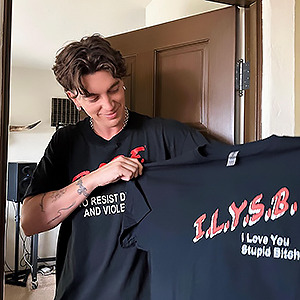


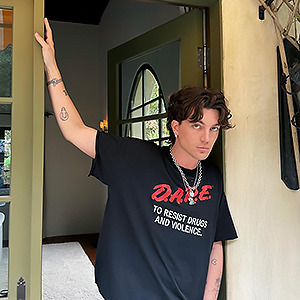



#paul klein#paul klein icons#icons paul klein#paul jason klein#paul jason icons#icons#paul icons#boys#boys icons#male icon#males icons#twitter stuff#twitter icons#without psd#lany#lany icons#mama's boy#ilysb#indie#indie boys#gg bb xx#malibu nights#thick and thin#super far#cowboy in LA#LANY#pink skies#you!
45 notes
·
View notes
Text
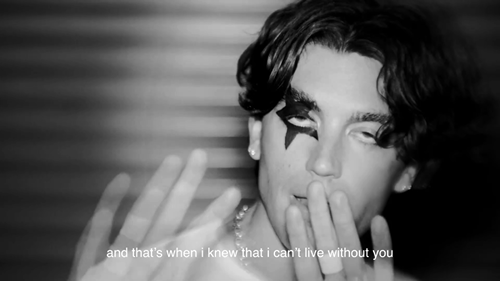
LANY - Love at first fight (2023)
24 notes
·
View notes
Photo




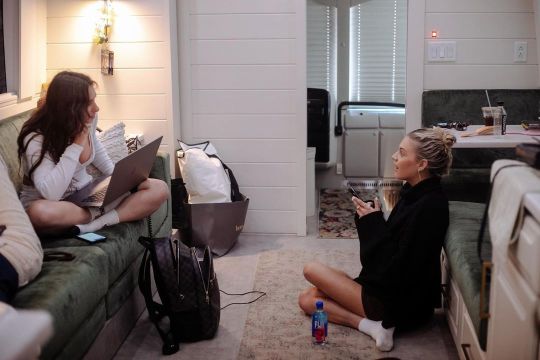




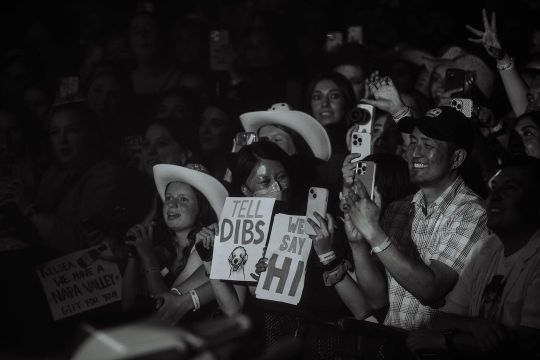
kelseaballerini: OAKLAND YOU WERE A DREAM and having @pauljasonklein come surprise you felt like christmas (we brought i quit drinkin out of retirement AND got to sing my favorite @thisislany song cowboy in la 🤠😍)
8 notes
·
View notes
Text

Paul Klein
7 notes
·
View notes
Text

I know you don’t remember.
I know you didn’t notice me that night even tho the room was small. Even tho the group of people could be counted in one hand.
You were there, black leather pants, long hair. You probably don’t remember, but I do!
I keep going back to that day wishing that time could have stopped. That we could have had one more moment. That you could hold my hands one more time.
I didn’t turn around to look at you because I knew if I did, I wouldn’t be able to take my eyes off of you. And part of me knew that you wouldn’t notice and since time won’t go back, I sit here wondering how life would be if I only had a sleeve of a chance.
What would I wear? What would you say? How would you hold me?
Is it too crazy to wonder that? I never really imagined to be in the same room as you.
So many shows before, so many long nights waiting for a new album to drop. So many songs to be heartbroken about when the truth is, I really wish you could be the one breaking my heart.
I know you don’t remember about that night, but I do.
2 notes
·
View notes
Text






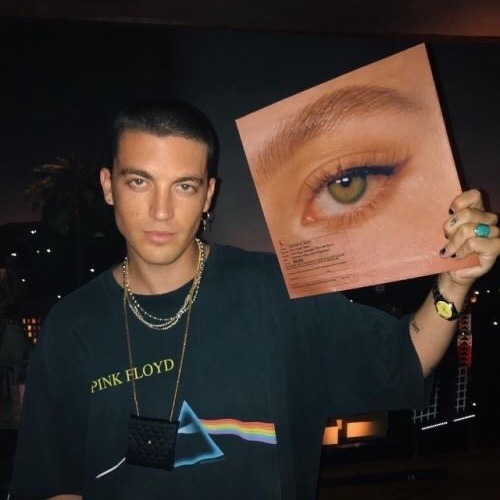


PAUL KLEIN
5 notes
·
View notes
Text










3 notes
·
View notes
Text
Le désir de connaître mais aussi la troublante expérience de l'embarras et du tâtonnement confèrent à la réflexion philosophique sa dimension érotique. Pour les mêmes raisons, l'amour est philosophie : l'amoureux s'arrache à son propre point de vue pour porter sur lui-même et le monde le regard d'autrui, subit l'épreuve du doute après l'enthousiasme et nourrit sa réflexion d'incertitudes. Il ne sait plus ce qu'il sait, cherche ses mots, ne sait comment définir l'être aimé et craint d'être sot. Cette hésitation essentielle l'affranchit de la présomption et de l'idiotie. L'idiot, en effet, ne connaît pas l'amour et ses dérèglements : il est partout chez lui, jamais troublé ni dérangé par personne.
Dans ces Fragments d'un discours amoureux, Roland Barthes nous permet de saisir à quel point l'amour, loin de nous rendre aveugles, est éclairant. Lumineuse expérience de la relativité de soi et de tout, l'amour brise la cohérence préétablie de nos pensées toutes faites et des discours les mieux rodés. Un livre éclatant, à lire éperdument.
—Paul Klein sur Fragments d'un discours amoureux de Roland Barthes.
1 note
·
View note
Text









#paul klein#paul klein icons#icons paul klein#paul jason klein#paul jason klein icons#pjk#pjk icons#icons#boys#boys icons#male icon#males icons#twitter stuff#twitter icons#lany#lany icons#xxl#ilysb#a beautiful blur#malibu nights#paris fashion week#mama's boy#pink skies#alonica#super far
12 notes
·
View notes
Text
【LANY/ Thick and Thin】和訳 解説 LANYについて 失った愛 Dua Lipa? Ended love
【LANY/ Thick and Thin】和訳 解説 LANYについて 失った愛 Dua Lipa? Ended love
Lyraのブログへ #LANY #ThickandThin #MalibuNights #レイニー #PaulJasonKlein #GossJakeClifford #PaulKlein #JakeCliffordGoss #MikeCrossey #SideStreetEntertainment #LesPriest #PolydorRecords #JakeGoss #summersonic
Grunge RockやPunkやHeavy Metal好きなLyraなので激しい系やDeepなサウンドしか聞かないように思われがちですが、Popsも好きで周期的に毎日ヘビロテしてしまう時がやって来ます。今は何でもござれのPops寄りの時期みたい。
今日は、Lyra’s Monologueで時々、取り上げて来たバンドLANYを取り上げましょう。
LAとNYを行ったり来たりしてる彼ら。サウンドもスタイリッシュで都会的。それでいながら都会の冷静な音というより、温かみのあるサウンドで聴いてると心地よいのです。
この和訳もまた書いたまま掲載し忘れていたので、気がついたら直ぐにUPしないと他のアーティストと同じくまた放置してしまうから早速UPします。
それに今の季節にぴったりな爽やかで海が似合う、ちょっぴりほろ苦い曲だから。一緒に気持ち良いおセンチ・ロックに浸りましょ。
Congrats on…

View On WordPress
#dua lipa ex#Ended love with Dua Lipa?#Ended love with dua?#Goss Jake Clifford#Jake Clifford Goss#Jake Goss#Klein Paul Jason#LANY summer sonic 2023#LANY サマーソニック#Lany 和訳 解説#Lany/ Thick and Thin lyrics#Lany/ Thick and Thin lyrics meaning#Lany/ Thick and Thin 和訳#Les Priest#malibu nights#Malibu Nights 和訳解説#Mike Crossey#Mike Crossey producer#paul jason klein#Paul Klein#Polydor Records#Side Street Entertainment#summer sonic2023#Thick and Thin 和訳 解説#【Lany/ Thick and Thin】和訳#【LANY/ Thick and Thin】和訳 解説 LANYについて 失った愛 Dua Lipa?#【LANY/ Thick and Thin】和訳 解説 LANYについて 失った愛 Dua Lipa? Ended love#サマソニ#サマソニ2023#サマーソニック 2023
0 notes
Text
feel like pure shite just read about paul klein from lany 🤢
#my stomach actually hurts#i began a hyperfixation on lany this week and was rly digging their songs#went thru all their socials#but i just came across a very detailed account of Paul's behavior with their very young fan base#dating all the way back to 2015#dudes like 33-34 rn#and has dated women 8-10 yrs younger than him#yes sure theyre adults but its alwayysssss sus when a 29 y.o is looking at a 22 y.o and so on#fans even younger from 17-22 have been targeted groomed and emotionally manipulated by him for sex and pics and have been gaslit by him#emo emo emo#i guess if a guy is in his 30s and dresses like hes 17 you should be sus#actually sick to my stomach#there are SO many women with SCREENSHOT evidence from over the YEARS coming forward#and at least 4 people from their team are well aware of and some have participated in this behavior#UGH#and he touts himself as a christian#GROSS#paul jason klein#paul klein#lany
1 note
·
View note
Text



Paul, Linda, Heather and Mary pictured arriving at Heathrow Airport, March 25, 1971.
#(Fresh off the court ruling in favor of appointing a receiver to protect himself against Klein)#(They know they ate.)#1971#Paul McCartney#Linda McCartney#Heather McCartney#Mary McCartney
178 notes
·
View notes
Text
A BEATLE DIDN’T SAY THAT! Lewisohn’s lab-created quotes
“One of the things about this book that is a strength is it’s not me saying anything, it’s them or other people. I shape the text, I plot where it goes, I weave it, but the quotes are theirs. And so when I’ve got Paul McCartney behaving in a way some readers might think, ‘Whatever, oh dear,’ it’s actually him saying it. So you end up thinking that to his own credit he said that. It’s not me saying it.” (Mark Lewisohn, ‘Noted,’ (October 7, 2013) Somerset, Guy.)
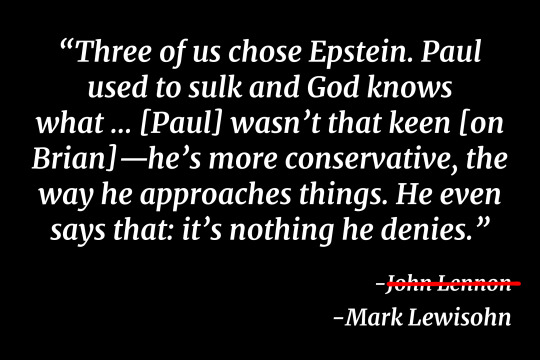
This is hella long, and that's because it's actually a full blog post. (In case you want it in a less monstrous form.)
A lot of people for a long time have put a lot of trust in Mark Lewisohn’s footnotes. Or at least in the fact of those footnotes. Because once you dig through them for any length of time you quickly discover that Mark Lewisohn’s footnotes hold secrets that would get him expelled from any undergraduate program. They reveal a “history” often contrived through a mass of Frankenquotes, ala carte creations, Lewisohn rephrased ‘paraphrases,’ and worse. For some parts of the narrative things aren’t too bad, yet in others monsters lurk around every corner. But this is not the sort of thing that’s graded on a curve, and it is past time to have a conversation about what standards should be accepted in Beatles’ scholarship.
Lewisohn lists his sources unlike most others. And his footnotes alone are more insightful than some other writers’ books. (Reddit, r/beatles)
I do not judge footnotes based on their insightfulness, nor do I want to single out a redditor, but I grabbed the comment because it’s an opinion that is widely shared and even accepted as canon. At least by people who have not combed those freakish footnotes. And while the pages of piled up sources do look fearsome en masse, a closer inspection reveals an offense to the truth, a threat to the record, and a blight on Beatles’ historiography.
“The rules for writing history are obvious. Who does not perceive that its chief law is never to dare say anything false, and never dare withhold anything true? The slightest suspicion of hatred or favor must be avoided. That such should be the foundations is known to all; the materials with which the building will be raised consist of facts and words.” –Cicero
A Look at Lewisohn’s Lab-created Frankenquotes
FIRST, WHAT ARE QUOTES? AND WHY ARE QUOTES?
Quotes are the soul and center of recorded—and recording— history.
And the rules around quotes and quotation marks are pretty simple. Most people, even if they’ve never written anything beyond a term paper, understand what quotation marks represent.
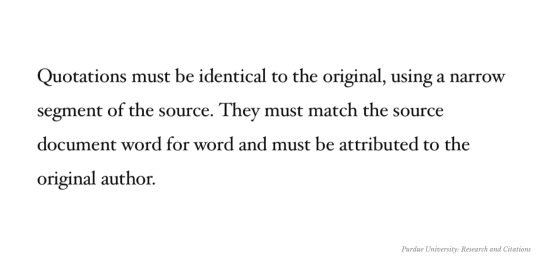
A set of quotation marks means, “This person said or wrote ‘these exact words’ at some given time.” You can smash a quote from two hours before or two years before right up against a separate quote to make your point—although it might get your grade lowered—but what you cannot do is take two different statements from two different times and make them seem like they are one statement.
When you put words inside one set of quotation marks you are stating, in black and white, that the identified person made this statement. That they said all those words together—or if you want to excise a reasonable part and use ellipses to represent that— as part of the same statement.
Look, combining two separate quotes that are not part of the same thought or topic is not a subjective issue. It is not an issue of controversy. Quotes are the bone marrow of written history. Quotes are the alpha and omega. In academic work or journalism they have to be, which makes sense as soon as you think about it. If it was cool for me to take a transcript and grab half a sentence from page 2 and half a sentence from page 17, push them together as if those words were spoken one after the other in a single thought, I bet I can manage to get those words to say almost anything I want.
Separate thoughts must be in two separate quotation marks. Separate. Somewhere between four sentences and a paragraph is widely accepted as the “two separate quotes” line, and there can be some ethical and technical wiggle room in a long rant by a person, but what makes all that subjective nonsense go out the window is if the quotes come from two separate questions. Or two separate days. That’s two quotes. Not hard.

Which again, makes sense if the point is conveying information to the reader and lessening the chance of a writer manipulating someone else’s words to express something that the person didn’t mean.
This is the contract inherent in a quote. These are the rules we all agree to and understand, and these are the reasons why. And there’s no reason to break them.
Why do you want me to believe that John said these two things at one time? What was wrong with what he did say?
THE FOUR MOST COMMON WAYS MARK LEWISOHN MAULS THE MEANING OF THE QUOTE:
The Basic Lewisohn Frankenquote 🧟♂️
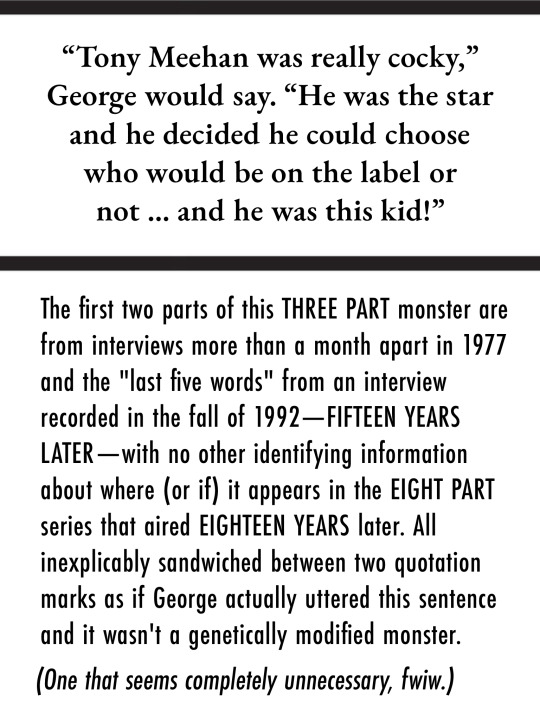
(“CONCLUDING FIVE WORDS FROM—” – I cannot even see the point of this THREE PART monster. Full footnote reads: 9) Author interview with Tony Meehan, September 6, 1995. (“I met George again in 1968 and for some reason he was harboring a grudge against me. He was very, very uptight about it—’You blocked us getting a recording contract …’ ”) First part of George quote from interview by Terry David Mulligan, The Great Canadian Gold Rush, CBC radio, May 30 and June 6, 1977; concluding five words from interview for The Beatles Anthology)
This three-headed monster attributed to George Harrison is a very dull little guy. Not particularly venomous. Just convenient, I guess. For whatever reason, Mark Lewisohn decided it was worth rummaging through the quote buffet until he collected enough pieces for George Harrison to say this thing. “…concluding five words from…” What are we even doing here? No, really. Please tell me.
And like a lot of the footnotes for these bespoke quotations, there are further problems. “[F]rom interview for Beatles Anthology”? An interview that aired? In one of the episodes? Can you narrow it down? I guess I’ll just have to listen very closely to them all and hope I don’t miss the five words.
But if we got bogged down in the sorts of trivial details that would immediately lose a college student a letter grade off a History 101 paper we would never get anywhere. We have to stick to the violent felonies.
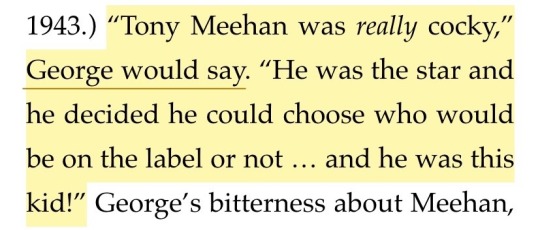
*Love the "George would say——" Uh, would he? Well, I guess after all that trouble you went to, he would now. It's really incredible how cavalier Lewisohn is about a Beatle's words.
These sorts of reconstituted, lab-engineered, made up “quotes” are shot throughout Tune In. “Quotes” made up of words from two, three, and even four sources, spoken months or often years apart.
Ala Carte Creations 🍱
It really is a buffet, and these ala carte creations come in all shapes and sizes. They might just be words that have been plucked up and glued back together to make something more useful to a particular narrative. (Ellipses or dash optional.)
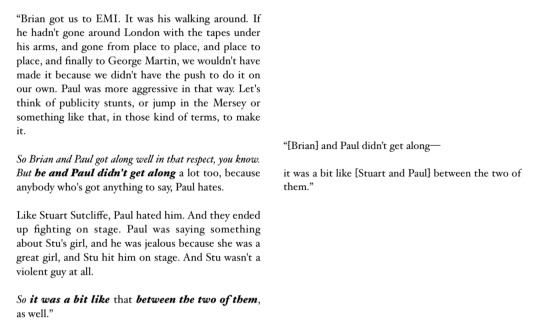
TUNE IN: “John saw a bigger picture, and it would be surprising if it wasn’t equally obvious, or made obvious, to Brian and George. He likened Paul’s enduring snag with Brian to his other long-standing difficulty: ‘[Brian] and Paul didn’t get along—it was a bit like [Stuart and Paul] between the two of them.’” (Footnote 37: Interview by Peter McCabe and Robert D. Schonfeld, September 1971)
Bonus 🍒 Phoebe's dramatic reading of John's original quote:
The Donut 🍩
Then there are a seemingly uncountable number of “quotes” with a sentence or three ripped out from the middle, but with zero representation that more words were ever there. (And in most of these particular deceptions, the simple representation of something excised (. . .) would make the quote fine. There are a lot of these, but they are also the easiest to fix.)

Chapter 10: “I was in a sort of blind rage for two years. [I was e]ither drunk or fighting. **It had been the same with other girlfriends I’d had.** There was something the matter with me.”
And then there are the true buffet bonanzas, words lifted and twisted beyond recognition until they say something brand spanking new.
However, John remembered Paul’s attitude to Brian being very different. John was always emphatic that Paul didn’t want Brian as the Beatles’ manager and presented obstacles to destabilize him, to make his job difficult … like turning up late for meetings. “Three of us chose Epstein. Paul used to sulk and God knows what … [Paul] wasn’t that keen [on Brian]—he’s more conservative, the way he approaches things. He even says that: it’s nothing he denies.”
The Lewisohn Remixes 🍸
And then there are the “paraphrases.” I couldn’t even begin to guess how many of these there are, and often they aren’t even paraphrases, but whole new Mark Lewisohn re-interpretations with quotation marks slapped around them. But if you don’t check, you probably won’t know, because like this Lewisohn rewrite of a well-known Mrs. Harrison quote, there’s a good chance you’ll recognize the bulk of it, making it less likely that you’ll catch the scalpel work excising Paul. And while I don’t want to get caught in the nooks and crannies of intent in an example like this one I have to say, just this once, that what has to be a purposeful excising of Paul to create a slightly new quote on one side, combined with a badly acted, bad faith—(or bad scholar)—“Where was Paul when John’s mom died?” on the other, is par for the course.
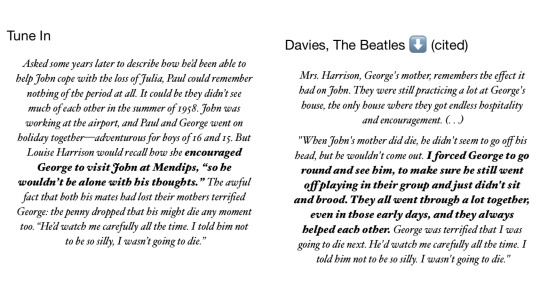
George Harrison’s mom’s made up Lewisohn rephrase which coincidentally removes Paul from the imagery.] ❦ LEWISOHN:“ Asked some years later to describe how he’d been able to help John cope with the loss of Julia, Paul could remember nothing of the period at all. It could be they didn’t see much of each other in the summer of 1958. John was working at the airport, and Paul and George went on holiday together—adventurous for boys of 16 and 15. But Louise Harrison would recall how she encouraged George to visit John at Mendips, “so he wouldn’t be alone with his thoughts.” ❦ DAVIES: “They were still practicing a lot at George’s house, the only house where they got endless hospitality and encouragement. . . . I forced George to go round and see him, to make sure he still went off playing in their group and just didn’t sit and brood. They all went through a lot together, even in those early days, and they always helped each other.”
Why do you have to slice and dice and reconstitute people’s words? No writer, and certainly no historian, should ever feel empowered to take words from a historical figure from two or three different places and topics and times, splice them together, and tell us, “Winston Churchill said this.” No he didn’t! Why are you so intent on changing the words of the people you’re writing about? What’s wrong with just using two different quotes?
You cannot take two or three quotes from two or three or even four separate statements, stick them between one set of quotation marks and say John or Paul or George or Joe Smith said this.
No they didn’t. They never said that. Why do you want me to think they did??
All these words are Abraham Lincoln’s, but this is not a Lincoln quote:
“Every man is said to have his peculiar ambition. Whether it be true or not, I can say for one that I have no other so great as that of — making a most discreditable exhibition of myself.”
(I kept it ridiculous, although I didn’t have to.)
But I want you, the reader, to be saying to yourself, “Okay, enough already. I get it!” Because in the last few days I have wandered too far into the weeds too many times and written far too many words detailing the multiplicity of ways Mr. Lewisohn does violence to each and every law of reporting historical facts, and could write many more. And I will post a more detailed list of the crimes against the quote that I am charging Mark Lewisohn with as we go forward, but I don’t think we need that now. The fact is that every fair-minded person knows what quotation marks represent, and there is no more fair-minded group of people than serious Beatles fans and scholars. And it is those fair-minded scholars who I want most to hear me. Whether you’ve written books or host a podcast or just know that you know a whole lot of stuff and take seriously your part of the trust in preserving the truth about The Beatles for us and future generations, it is you I am really talking to. My Cicero quoting-freaks. The ones who care about getting it right.
“The chief, the only, aim of style is to put facts in a clear light, with no concealment.”
- Lucian of Samosata
What footnotes can do, and what footnotes can’t.
You can list multiple sources in a single footnote. That’s not only fine, it’s correct. If I want to tell part of a story based on several sources, that often means several sources in a footnote. But not for one, single quote.
The problem isn’t the footnote, it’s the bioengineered quote on the page that you swept under a footnote hoping I wouldn’t notice.
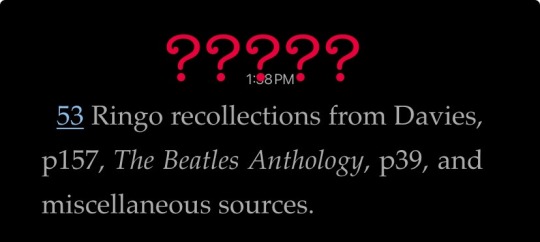
Which leads us to what a footnote is not. A footnote is not a post-hoc fixative for your textual sins. You cannot do whatever you want as long as you confess it in a footnote. A footnote is not a magic spell. A footnote is not the universally understood symbol for “I have my fingers crossed behind my back.” You cannot fix lies and misrepresentations in the footnotes. Footnotes aren’t for trying to chase down three different sources to match up which part of a manufactured “quote” someone said on which date. Footnotes are not the picture on the front of a puzzle box. I should not need to find corner pieces to figure out which of these George Harrison words were actually spoken together.
Footnotes are a truthful and independently verifiable record of primary sources. It’s that simple.
And taking Mark Lewisohn completely out of the picture for a moment, I feel sure we can all agree that neither John Lennon nor Paul McCartney nor George Harrison nor Ritchie Starkey would want anyone rearranging their words as if they were guitar chords. You wouldn’t take three-quarters of Penny Lane and one-quarter of Across the Universe, put them together and call it a Beatles‘ song. So don’t take three quarters of John to Jann Wenner and one-quarter of John to Lisa Robinson, put them together and call it a Beatle’s quote.
MY PERSONAL STANDARD IS THAT IF SOMEONE REPRESENTS, “A BEATLE SAID THIS,” IT BETTER DAMN WELL BE SOMETHING A BEATLE SAID.
None of the Beatles, dead or alive, would be cool with their words being taken out of context at all, let alone two or three different statements on god knows what being combined into one. This isn’t hard, though. Use two or three separate quotation marks, and don’t take statements out of context. Don’t mix and match their words, but don’t twist them, either. If a person said something, it is the historian’s duty to represent those words to the best of your ability, and then use them to tell a factual story focused on what you feel is important. Staying true to the original words and true to their meaning. If you can’t use those words without twisting them, then change your story to fit their words, not the other way around. If their statement helps tell the story your way, use it! For goodness sake, John Lennon said at least two opposing things about almost every topic on earth, so there should be enough to choose from without being deceptive. I actually want the truth. Don’t you?
Biography is story based around accurately represented, trustworthy and verifiable facts. And look, Beatles fans, whoever your favorite is: we are not going to get the truth about his history if we don’t learn to take these things seriously. Let’s have—if not high standards—at least the lowest generally accepted standards. In the mid-term we need a lot more Beatles scholars with a lot more points of view, and now—right now—we need experienced Beatles scholars to prioritize searching out and finding smart, interested people to mentor. And we simply must ensure that we aren’t allowing to solidify into stone “facts” that are not facts and statements no one ever made. I don’t think any honest Beatles fan—(which rounds up to all of them)—wants any question around that issue.
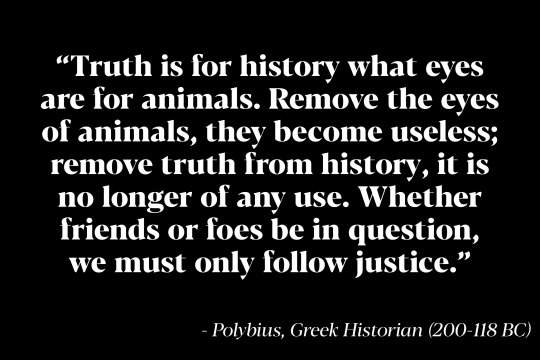
The record is the most important thing. Now, and always. This is not about John versus Paul. John versus Paul may live on always in our hearts, but for Beatles history, it’s the wrong question. I’d rather someone be up front about their loves, but in the end the focus should be on representing the primary facts in their most pristine form. Love who you love most, but place truth above all. Pristine facts. Pristine quotes. Nothing hidden. Nothing misrepresented.
Let the historical actors speak for themselves. That is their right.
And the historian’s duty.
NEXT, WE DISSECT A MONSTER.

Final note: I became frustrated and (maybe strangely) offended by Lewisohn's obscene pretenses in 2020, but my frustrations were nebulous and unfocused until this incredible AKOM series. I feel much better now. Angrier. But better. They worked their asses off. 🥂
#lewisohn#akom#the beatles#tune in#fine tuning#frankenquotes#lewisohn's monsters#historiography#paul mccartney#john lennon#george harrison#ringo starr#mark lewisohn#a beatle never said that#beatles#brian epstein#allen klein#Spotify
161 notes
·
View notes


